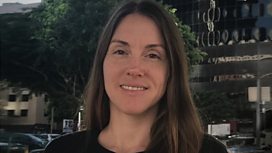Apocalypse How
Eleanor Rosamund Barraclough asks if we are hardwired to think apocalyptically, investigating how different cultures have viewed the end of the world.
Have recent events made you wonder if the world is coming to an end? When you hear someone in the media talk in apocalyptic terms, do you respond with scorn, scepticism, or a nagging feeling that they may just be right. Are we in fact hard-wired to think apocalyptically?
History suggests that we might be. Myths and stories of "end times" recur at many different times and in many different cultures.
Scholar, cultural historian and New Generation Thinker Eleanor Barraclough sets out to explore some of the less familiar visions of the world's end and what these beliefs tell us about ourselves.
On Hadrian's wall we find out from historian John Henry Clay how the prophecy of the twelve vultures that foretold the end of the Roman Empire proved uncannily accurate.
On the mystic Isle of Lindisfarne we learn from medieval historian James Palmer why the Christian Anglo-Saxons believed Doomsday was terrifyingly near.
Old Norse expert Heather O'Donoghue shows Eleanor images carved on a 10th-century cross depicting the terrible scenes of Ragnarok, meaning 'the doom of the gods': One wolf swallows the sun and another swallows the moon, the mountains fall down and the world collapses.
The Norse regarded Ragnarok as something far off and mythical, rather than an imminent threat. Flor Edwards, however, grew up believing the world would end in 1993 when she was twelve. She and her parents were members of a Christian apocalyptic cult called The Children of God. Flor explains how she attempted to come to terms with knowing she and her parents would die before she reached adulthood.
Malise Ruthven, historian of Muslim theology, examines the links between apocalyptic thinking and early Islam.
The political philosopher John Gray discusses how George W Bush responded to the 9/11 terrorist attacks by evoking traditions of apocalyptic myth which Gray believes had their roots in Puritan fundamentalism. He explains how, in his opinion, Christian apocalyptic thinking introduced the idea of progress in history.
But how do Eastern faiths see the end of the world? Theodore Proferes from the University of London explains how Hinduism and other ancient eastern religions emphasise a cyclical perspective on time. He tells Eleanor about the World Ages, or Yugas, where worlds die and are reborn in a continuous rotation.
Tim Barrett, a specialist in the religions of China, reveals how scriptures from many centuries ago are now coming to light and yielding surprising details about Daoist ideas of apocalypse.
Author Naomi Alderman is the co-creator of a fitness app called Zombies, Run! She explains why the idea of the zombie apocalypse became a popular theme in the 1960s and tells Eleanor about Jewish visions of the end of the world and the great battle between Leviathan and Behemoth.
At the end of this cataclysmic journey Eleanor asks whether humans have a predisposition towards "end times" thinking, and if so, what purpose does it serve? Does she come to a suitably apocalyptic conclusion?
Presenter: Eleanor Rosamund Barraclough
Reader: John Dougall
Producer: Philippa Ritchie
Eleanor Rosamund Barraclough of Durham University has just published 'Beyond the Northlands: Viking Voyages and the Old Norse Sagas'. Four years ago she was one of the New Generation Thinkers, a scheme run by ���˿��� Radio 3 and the Arts and Humanities Research Council to select ten people who can turn their research into radio and television.
Last on
More episodes
![]()
Flor Edwards grew up believing the world would end when she was 12. This is her story.
Broadcasts
- Sun 15 Jan 2017 18:45���˿��� Radio 3
- Fri 7 Sep 2018 22:15���˿��� Radio 3
Featured in...
![]()
New Generation Thinkers—Free Thinking
From prison breaks to VR dinosaurs: insights from the AHRC & ���˿���'s scheme for academics.
![]()
Arts
Creativity, performance, debate
What was really wrong with Beethoven?
Classical music in a strongman's Russia – has anything changed since Stalin's day?
What composer Gabriel Prokofiev and I found in Putin's Moscow...
Six Secret Smuggled Books
Six classic works of literature we wouldn't have read if they hadn't been smuggled...
Grid
Seven images inspired by the grid
World Music collector, Sir David Attenborough
The field recordings Attenborough of music performances around the world.





